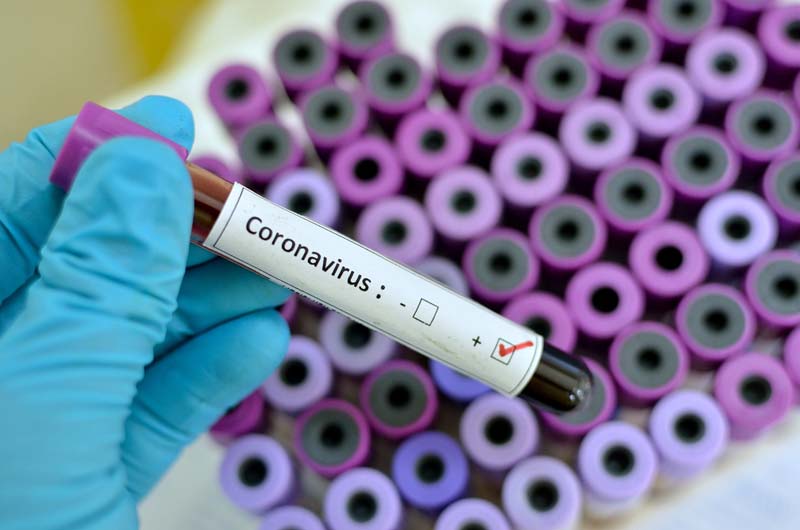LOS ANGELES: The immune system’s memory helper T cells which recognise the common cold virus and help the body fight it off, also identifies some parts of the novel coronavirus, according to a study whose findings may explain why some people have milder COVID-19 cases than others.
The research, published in the journal Science, noted that the immune system’s memory T cells keep track of the viruses they have seen before, giving the cells a headstart in recognising and fighting off repeat invaders.
However, the scientists, including those from La Jolla Institute (LJI) in the US, cautioned that it is too soon to say whether such pre-existing immune cell memory affects COVID-19 clinical outcomes.
“We have now proven that, in some people, pre-existing T cell memory against common cold coronaviruses can cross-recognise SARS-CoV-2, down to the exact molecular structures,” said Daniela Weiskopf, a co-author of the study from LJI.
“This could help explain why some people show milder symptoms of disease while others get severely sick,” Weiskopf said.
Alessandro Sette, another co-author of the study from LJI, noted that the reactivity of the immune system may translate to different degrees of protection.
“Having a strong T cell response, or a better T cell response may give you the opportunity to mount a much quicker and stronger response,” Sette said.
An earlier study by Sette and his team had shown that 40 to 60 per cent of people who were never exposed to the novel coronavirus SARS-CoV-2 had T cells that reacted to the virus.
According to the study, the immune systems in these individuals recognised fragments of the virus it had never seen before — a finding which was also reported among people in the Netherlands, Germany, Singapore, and the UK.
In the current research, the scientists assessed samples collected from study participants who had never been exposed to SARS-CoV-2.
They defined the exact parts of the virus that are responsible for the cross-reactive T cell response.
Their analysis showed that unexposed individuals can produce a range of memory T cells that are equally reactive against SARS-CoV-2, and four types of common cold coronaviruses.
Based on the finding, the scientists said fighting off a common cold coronavirus could teach the T cell compartment to recognise some parts of SARS-CoV-2 as well.
They believe this process provides evidence for the hypothesis that common cold viruses can, in fact, induce cross-reactive T cell memory against SARS-CoV-2.
“We knew there was pre-existing reactivity, and this study provides very strong direct molecular evidence that memory T cells can ‘see’ sequences that are very similar between common cold coronaviruses and SARS-CoV-2,” Sette said.
The scientists found that while some cross-reactive T cells targeted the SARS-CoV-2’s spike protein — the region of the virus that recognises and binds to human cells — pre-existing immune memory was also directed to other SARS-CoV-2 proteins.
Sette noted that the finding is relevant since most vaccine candidates target the spike protein.
The findings, according to the researchers, suggest the hypothesis that inclusion of additional SARS-CoV-2 targets might enhance the potential to take advantage of this cross reactivity, and could further enhance vaccine potency. (AGENCIES)
&&&
BIZ-MAHINDRA-THAR-LAUNCH
M&M to launch all-new version of Thar on Aug 15
NEW DELHI, Aug 5:
Automaker Mahindra & Mahindra (M&M) on Wednesday said it will launch the new version of its SUV Thar on August 15.
The all-new Thar will be a quantum leap in terms of technology, comfort and safety features compared to the previous generation without compromising on the vehicle’s core promise -– off-road capability and its iconic design, M&M said in a statement.
“This will not only attract the die-hard Thar enthusiasts, but also appeal to all those people who have always wanted to own an iconic vehicle with all the bells and whistles of a contemporary SUV,” it added.
In its new avatar, the Thar aims to bring back the pleasure of motoring, providing an exceptional blend of iconic design and unadulterated driving pleasure, the company added.
The existing Thar is priced between Rs 9.7 lakh and Rs 9.99 lakh (ex-showroom Delhi).
From 2010 the Thar has been the flag-bearer of ‘The Mahindra Classics’ which for over seven decades now have shared a close bond with India’s story enabling Indians to explore new terrains and “do things that they could never have done before”, the company claimed. (AGENCIES)
^^^
BIZ-VIRUS-LUPIN-FAVIPIRAVIR
Lupin launches COVID-19 drug Favipiravir in India at Rs 49 per tablet
NEW DELHI, Aug 5:
Drug major Lupin on Wednesday announced the launch of its Favipiravir drug under the brand name ‘Covihalt’ for the treatment patients with mild to moderate COVID-19 symptoms at Rs 49 per tablet in India.
Favipiravir has received authorisation from the Drug Controller General of India (DCGI) for emergency use, Lupin said in a regulatory filing.
Its Covihalt dosage strength has been developed keeping in mind convenience of administration, it stated, adding that the drug is available as 200 mg tablets in the form of a strip of 10 tablets, and priced at Rs 49 per tablet.
Lupin President – India Region Formulations (IRF) Rajeev Sibal said the company believes that it can leverage its expertise in managing widespread community diseases like tuberculosis to proactively reach patients across India and ensure access to Covihalt through its strong distribution network and field force.
On August 4, Sun Pharmaceutical Industries had launched Favipiravir under the brand name ”FluGuard” for the treatment of mild to moderate cases of COVID-19, at Rs 35 per tablet in India.
(AGENCIES)


